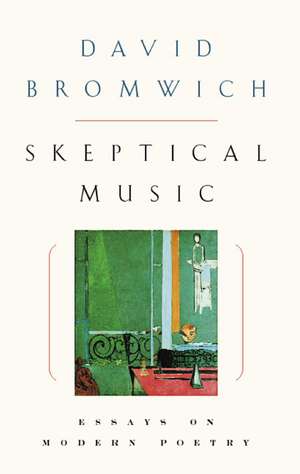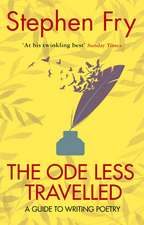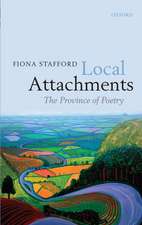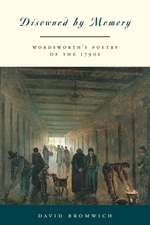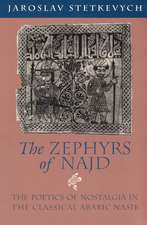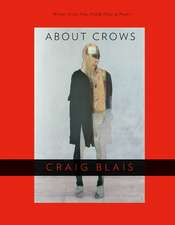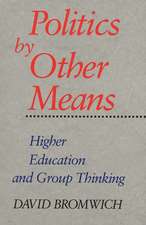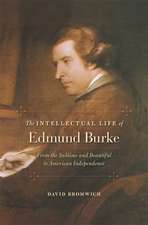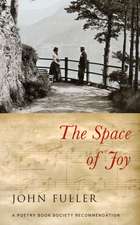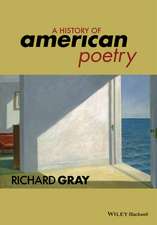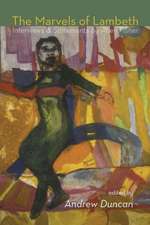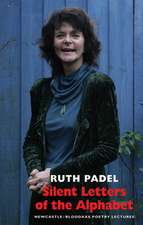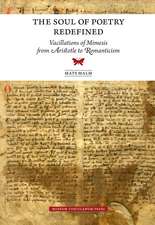Skeptical Music: Essays on Modern Poetry
Autor David Bromwichen Limba Engleză Paperback – 3 iun 2001
Skeptical Music collects the essays on poetry that have made David Bromwich one of the most widely admired critics now writing. Both readers familiar with modern poetry and newcomers to poets like Marianne Moore and Hart Crane will relish this collection for its elegance and power of discernment. Each essay stakes a definitive claim for the modernist style and its intent to capture an audience beyond the present moment.
The two general essays that frame Skeptical Music make Bromwich's aesthetic commitments clear. In "An Art without Importance," published here for the first time, Bromwich underscores the trust between author and reader that gives language its subtlety and depth, and makes the written word adequate to the reality that poetry captures. For Bromwich, understanding the work of a poet is like getting to know a person; it is a kind of reading that involves a mutual attraction of temperaments. The controversial final essay, "How Moral Is Taste?," explores the points at which aesthetic and moral considerations uneasily converge. In this timely essay, Bromwich argues that the wish for excitement that poetry draws upon is at once primitive and irreducible.
Skeptical Music most notably offers incomparable readings of individual poets. An essay on the complex relationship between Hart Crane and T. S. Eliot shows how the delicate shifts of tone and shading in their work register both affinity and resistance. A revealing look at W. H. Auden traces the process by which the voice of a generation changed from prophet to domestic ironist. Whether discussing heroism in the poetry of Wallace Stevens, considering self-reflection in the poems of Elizabeth Bishop, or exploring the battle between the self and its images in the work of John Ashbery, Skeptical Music will make readers think again about what poetry is, and even more important, why it still matters.
The two general essays that frame Skeptical Music make Bromwich's aesthetic commitments clear. In "An Art without Importance," published here for the first time, Bromwich underscores the trust between author and reader that gives language its subtlety and depth, and makes the written word adequate to the reality that poetry captures. For Bromwich, understanding the work of a poet is like getting to know a person; it is a kind of reading that involves a mutual attraction of temperaments. The controversial final essay, "How Moral Is Taste?," explores the points at which aesthetic and moral considerations uneasily converge. In this timely essay, Bromwich argues that the wish for excitement that poetry draws upon is at once primitive and irreducible.
Skeptical Music most notably offers incomparable readings of individual poets. An essay on the complex relationship between Hart Crane and T. S. Eliot shows how the delicate shifts of tone and shading in their work register both affinity and resistance. A revealing look at W. H. Auden traces the process by which the voice of a generation changed from prophet to domestic ironist. Whether discussing heroism in the poetry of Wallace Stevens, considering self-reflection in the poems of Elizabeth Bishop, or exploring the battle between the self and its images in the work of John Ashbery, Skeptical Music will make readers think again about what poetry is, and even more important, why it still matters.
Preț: 253.44 lei
Nou
Puncte Express: 380
Preț estimativ în valută:
48.50€ • 50.53$ • 40.15£
48.50€ • 50.53$ • 40.15£
Carte tipărită la comandă
Livrare economică 04-18 aprilie
Preluare comenzi: 021 569.72.76
Specificații
ISBN-13: 9780226075617
ISBN-10: 0226075613
Pagini: 288
Dimensiuni: 152 x 229 x 23 mm
Greutate: 0.41 kg
Ediția:1
Editura: University of Chicago Press
Colecția University of Chicago Press
ISBN-10: 0226075613
Pagini: 288
Dimensiuni: 152 x 229 x 23 mm
Greutate: 0.41 kg
Ediția:1
Editura: University of Chicago Press
Colecția University of Chicago Press
Notă biografică
David Bromwich is the Housum Professor of English at Yale University. He is the author of Disowned by Memory: Wordsworth's Poetry of the 1790s, published by the University of Chicago Press, and A Choice of Inheritance: Self and Community from Edmund Burke to Robert Frost.
Cuprins
Preface
Acknowledgments
1. An Art without Importance
2. Poetic Invention and the Self-Unseeing
3. T.S. Eliot and Hart Crane
4. Crane in His Letters
5. Stevens and the Idea of the Hero
6. Marianne Moore as Discoverer
7. "That Weapon, Self-Protectiveness": Notes on a Friendship
8. Elizabeth Bishop's Dream-Houses
9. The Making of the Auden Canon
10. Answer, Heavenly Muse, Yes or No
11. Geoffrey Hill and the Conscience of Words
12. Ted Hughes's River
13. A Poet and Her Burden
14. John Ashbery: The Self against Its Images
15. Hemingway's Valor
16. How Moral Is Taste?
Index
Acknowledgments
1. An Art without Importance
2. Poetic Invention and the Self-Unseeing
3. T.S. Eliot and Hart Crane
4. Crane in His Letters
5. Stevens and the Idea of the Hero
6. Marianne Moore as Discoverer
7. "That Weapon, Self-Protectiveness": Notes on a Friendship
8. Elizabeth Bishop's Dream-Houses
9. The Making of the Auden Canon
10. Answer, Heavenly Muse, Yes or No
11. Geoffrey Hill and the Conscience of Words
12. Ted Hughes's River
13. A Poet and Her Burden
14. John Ashbery: The Self against Its Images
15. Hemingway's Valor
16. How Moral Is Taste?
Index
